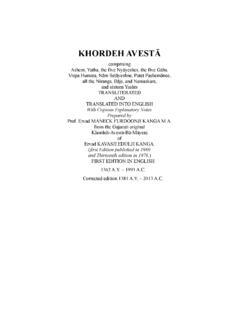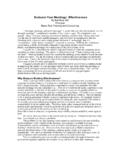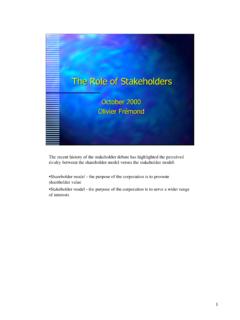Transcription of Vendidad (Vidēvdād) or Laws against the Demons …
1 Vendidad (Vid vd d) or laws against the DemonsAvesta The sacred Books of zoroastrianism , book by James Darmesteter (From sacred Books of the East, American Edition, 1898.) Edited by Joseph H. , Copyright 1995. All rights 1. Sixteen perfect lands created by Ahura Mazda, and as many plagues created by Angra 2. Myths of Yima [Jamshed]..20 FARGARD 3. the 4. Contracts and 5. Purity 6. Purity 7. Purity laws , Avestan 8. Funerals and purification, unlawful 9. The Nine Nights 10. Formulas recited during the process of 11. Special formulas for cleansing several 12.
2 The Upaman, how long it lasts for different 13. The 14. Atoning for the murder of a 15. Regarding certain sins and 16. Purity laws regarding 17. Hair and 20. Thrita, the first 21. Healing 22. Angra Mainyu creates 99,999 diseases; Ahura Mazda counters with the Holy Manthra and with IntroductionThe Vid vd d (or Vendidad ) is an ancient collection of Zoroastrian myths, prayers, and religious observances, intended to defend against sources of infection and evil. Particular attention is given to disposal of the dead and other dead matter (nasu), to keep disease from spreading, as well as avoid polluting the earth, water, etc.
3 Its present form is thought to have become fixed around the middle of the first millennium Of the twenty-one books of the Sasanian canon of the Avesta that were detailed in the Denkard, this is the only one which has survived in its entirety. James Darmesteter translated the text in 1880, relying heavily on the Pahlavi translation. In 1898 he published a revised translation. Fritz Wolff later translated the major texts of the Avesta into German, based on Bartholomae s monumental Avestan dictionary. According to Kellens, Darmesteter is sometimes superior in his understanding of the Vid vd d.
4 2 His notes in particular remain preparing this edition, I have replaced the spelling of Zoroastrian technical terms with more familiar forms, following Kotwal and Boyd, 1982, as much as possible. The Denkard book 8, chapter 44 gives this synopsis of the contents:31. The Vendidad contains particulars of Ohrmazd having produced the pleasure of mankind by that place where they specially made a residence, and the advantage from the same production. 2. About the formation of sixteen perfect places specially enumerated, and also the adversity which has happened to each separately.
5 3. About Ohrmazd s disclosing the religion first among mankind to Yim (Jamshed); its non-acceptance by Yim owing to attachment (asrunoih) to the religion of the ancients; and the acceptance of other things to develop, extend, and improve the world thereby. 4. About the reason of the needfulness of making the enclosure (var) that Yim made, the command and instruction by Ohrmazd to Yim, the making by Yim just as Ohrmazd commanded and instructed, and whatever is on the same subject. 5. About what the comfort of the spirit of the earth is most owing to, what its discomfort is more particularly owing to, and from what its greatest gratification has arisen.
6 1 Rose 2011, pp. 9, Kellens, Avesta, the holy book of the Zoroastrians Encyclop dia Iranica, , 1892, pp. 152 About the sin of pollution owing to carrying a corpse by a single person, relating, however, to that which a dog has not seen. 7. About the food, clothing, and place of him who becomes polluted and worthy of death through a corpse, on account of carrying it alone (aevako-barih rai). 8. About how the several precautions of mankind and other pure creatures are taken, as regards a corpse which has become polluted by another corpse. 9. About the pleasure of the spirit of the earth owing to sowing and tilling, and its vexation owing to not sowing and not tilling; the blessing upon the sowers, and the advantage and merit owing to sowing, on account of particulars about the nourishment and protection of the religion thereby.
7 10. About the destruction of the Demons which arises from the sprouting, growing, and ripening of corn; and the good success of mankind from the eating of it. 11. About the sin of burying a corpse through sinfulness, and for how much time is the uselessness of the ground in which the burial may be performed. 12. About the power of the good religion for wiping away sin from human beings. 13. About the sin of deceiving by an avaricious person (pashto) as regards what he has consumed and given, and the grievousness of other breaches of promise; the danger, even in the worldly existence, from maintaining him, and the retribution it is important for him to make.
8 14. About where there is steadfastness in the religion there is also a manifestation of this: when one becomes liberal as to every benefit that exists for him towards those of the same religion who come forward with a request. 15. About the extent of sleeping in the day and night, and other matters as to occupation which occurs daily. 16. About the grievous sinfulness of having taken a false oath, so that, apart even from the testifying retribution of the property, the oath taken thereon has also an efficacy very much for the accusers, which, on account of Mihr, Srosh, and Rashn, is an awful destroyer and adversary for one s own person, wife, child, and property; also the grievous bridge-judgment which is an appendage to one s own soul.
9 17. About the sin of bringing firewood, with which dead matter is mingled, to a fire; and this too, that is, how and when one is innocent therein. 18. About a ditch (joi), which is not always a stream (navo), when the water has to pass through it, and also that which is always a stream, when one wants to increase the water therein, how often and how one has to inspect them for fear of dead matter having been there. Introductioniii19. About death which is by reason of water or fire, and does not occur through the supremacy of water or fire, but is owing to the Demons . 20. About the great advantage owing to rain, and connected with raining on dead matter and the bodily refuse of depositories for the dead.
10 21. About the greatness and goodness of the law opposed to the Demons for cleansing, as compared with other utterances. 22. About pollution owing to bodily contact (ham-kerpakih) with a corpse, and to bodily contact with him who is in bodily contact with a corpse. 23. About the wicked villain who is an unrighteous apostate alive, and abstaining from association (avakih) with him. 24. About how long is the time of pollution of a house in which a dog or human being passes away, the carrying away theretofore of anything going thereto, and the avoidance of it; the place into which any one goes out, the feeding, and other things in that house within three steps, and whatever is on the same subject.









